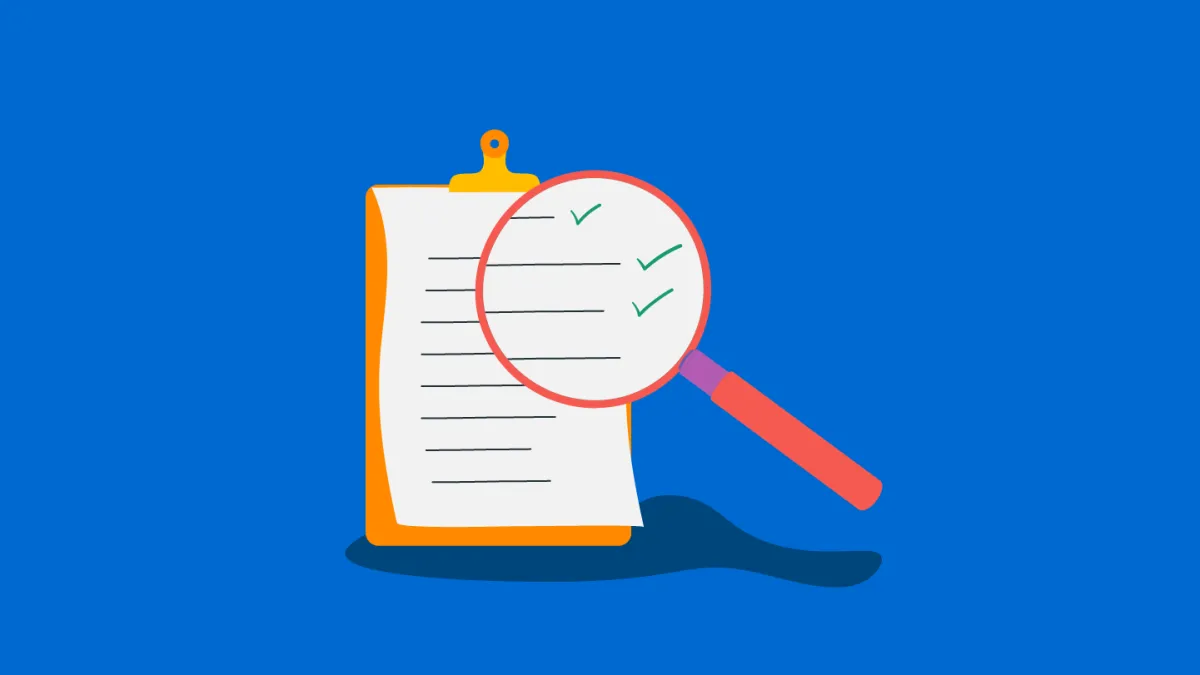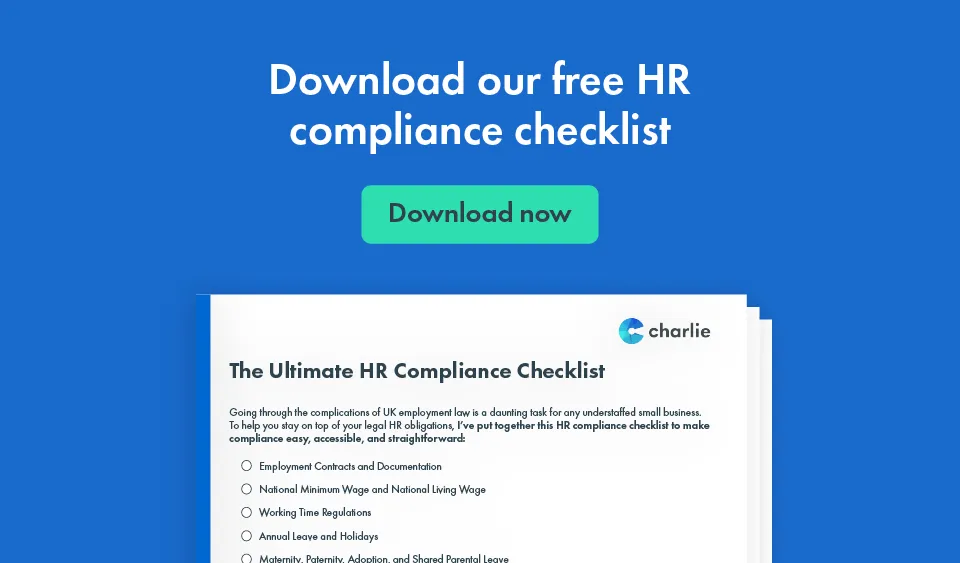HR compliance checklist – everything you need to know

Processes are the backbone of any strong business, and this is as true of your HR processes as anything else. That’s where your HR compliance checklist comes in.
An HR compliance checklist helps small businesses in the UK helps small businesses to adhere to laws and regulations regarding their employees' rights and responsibilities as an employer.
If you’re a small business owner or founder just getting started, your HR concerns are just one of the many responsibilities you have, and making a mistake can result in some serious consequences.
Teams in small companies have to wear a lot of hats. For example, I don’t just lead our HR team, I’m also in charge of our payroll, pensions, and finance.
I’ve stood side-by-side with founders through the painstaking process of building complex HR processes from scratch - including their HR compliance checklist that I’d like to share today.
If you don’t have time to read this, simply download our checklist today.
What is HR compliance?
HR compliance means abiding by the legal, ethical, and professional standards of human resources management.
It’s more than just a legal requirement for businesses in the UK - it’s about creating a positive workplace that respects the dignity and rights of your employees.
HR compliance covers legal aspects such as employment laws, health and safety regulations, and equality legislation. Beyond that, it also takes into account ethical considerations like the fair treatment of your employees and creating a transparent workplace culture.
Common HR compliance issues in the UK
Businesses can make honest mistakes in their HR compliance even if they mean well. Here are some of the more common ones you’ll have to navigate:
- Wage Regulations: If you fail to pay the National Minimum Wage or National Living Wage, you can face hefty fines and some harsh damage to your brand reputation
- Working Time Violations: Exceeding the maximum allowed weekly working hours or not providing enough breaks can lead to lawsuits and other legal action
- Discrimination: Unlawful discrimination based on age, gender, or ethnicity is not only unethical, but it’s also illegal
- GDPR and Data Privacy: Mishandling sensitive employee data and non-compliance with General Data Protection Regulation (GDPR) can lead to severe penalties and damage your trust in your employees
Understanding what the common issues and roadblocks are is the first step to creating a comprehensive HR strategy - and an HR audit checklist to navigate them with ease.
The purpose of an HR audit – checklist
An HR audit is a routine check of your HR processes and policies, which aims to make sure you’re staying compliant with UK employment regulations. However, it can also be a strategic tool to position your organisation for success.
Your HR compliance audit checklist serves multiple purposes:
Compliance verification
The main goal of your HR compliance checklist is to make sure your business is run according to UK employment law.
When you systematically review your HR policies, processes, and practices, an audit can spot potential problem areas and risks of non-compliance - whether that be for wage relations, working hours or other reasons.
Performance evaluation
A well-run HR audit also assesses how well your HR systems are performing.
Going through your HR audit evaluates your recruitment strategies, your training programs (think about how to put together a training agreement template for example), your employee engagement, and other places where you can refine your HR practices.
Then, with that knowledge, you can improve your HR processes to align with your business goals.
Risk management
Your HR audit checklist identifies vulnerabilities in your HR processes, so you can put preventative measures in place.
These can be discrimination issues, data security risks, and other vulnerabilities. Knowing where your HR processes are lacking can help you create a stronger and more resilient company.
The ultimate HR compliance checklist
Going through the complications of UK employment law is a daunting task for any understaffed small business.
To help you stay on top of your legal HR obligations, I’ve put together this HR compliance checklist to make compliance easy, accessible, and straightforward:
- Employment Contracts and Documentation
- Work statuses for all your team members
- National Minimum Wage and National Living Wage
- Working Time Regulations
- Annual Leave and Holidays
- Maternity, Paternity, Adoption, and Shared Parental Leave
- Sick Leave and Sick Pay
- Probation periods and notice periods
- Right-to-Work Checks (or pre-employment checks)
- Equality and Discrimination
- Data Protection and GDPR Compliance
- Termination of employment and Redundancy
- Health and Safety
- Pension Auto-Enrollment
- Training and Development
- Employee Handbook and Policies
- Trade Union and Employee Consultation
- Gross misconduct and disciplinary (find out more with our written warning template)
- Grievances and Dispute Resolution
- Employer's liability insurance
- Exit and Offboarding
I’ll go through each of these in a little more detail.
1. Employment contracts and documentation
Giving your new hires their employment contracts within two months of their start date is a legal requirement and the foundation of a strong relationship between you and your employees.
These contracts must include the employee’s job title, responsibilities of their role, working hours, salary, and more.
I and the other HR advisors at CharlieHR can create bespoke employment contracts customised to your business.
2. National wage regulations
Your employees have a right to earn a minimum wage.
Ensuring you’re paying your employees the National Minimum Wage and National Living Wage is important to compensate your employees fairly for their age group and maintain their trust.
3. Working time and annual leave
Maintaining a healthy work-life balance is a challenge, for anyone.
Your HR audit should monitor the working hours of your employees and make sure they’re taking their mandatory breaks.
In the UK, Working Time Regulations (WTR) oversee the working hours and annual leave of your employees. The average working time for an employee cannot exceed 48 hours per week, bearing special exceptions.
Your employees should get at least 28 days of paid annual leave.
Make sure to calculate and document your employees' holiday entitlement. That includes part-time and variable-hour employees.
You can make use of the CharlieHR time-off feature to keep track of how much paid holiday time your employees are allotted.
4. Maternity and parental rights
Make sure you’re informing your employees of their rights concerning maternity leave. That extends to paternity, adoption, and shared parental leave.
5. Right-to-work checks
Verifying that your employees have the legal right to work in the UK and having the documents to prove it is crucial.
The CharlieHR onboarding feature can automate a lot of the pencil-pushing busywork here, and take care of the verification process.
6. Equality and discrimination
Create a workplace culture that promotes equality, diversity and inclusion. The Equality Act of 2010 provides guidance on what counts as discrimination.
Building anti-harassment and anti-discrimination policies is at the heart of a respectful workplace. That way, you can create a workplace where everyone feels protected, heard, and seen.
7. Data protection and GDPR
Handling your sensitive employee data according to GDPR guidelines is non-negotiable.
The CharlieHR platform lets you securely and safely store all of your employee’s details and sensitive information in your data protection policy. That way, you stay compliant without risking the wrath of European Union privacy law. Our ISO 27001 certification means your data will be safe from cyberattacks and data leaks.
8. Termination and redundancy
Follow proper dismissal procedures, redundancy criteria selection and redundancy consultation requirements. These are necessary to make sure you’re treating your employees fairly when they’re let go or made redundant.
9. Health and safety
Implement safety practices, conduct risk assessments, and provide health and safety training to create a healthy work environment.
10. Pension auto-enrollment
Enrolling your eligible employees and informing them of their rights regarding their pension is part of responsible financial planning and legal compliance for your business.
11. Training and development
When you offer skill training and career development opportunities, you invest in your employees in a way that builds their loyalty, improves their performance, and builds your business’s growth.
12. Employee handbook policies
Keep an updated handbook of your HR policies on hand where your employees can access them if they need to.
Our HR advisors offer a handbook service that can help you make a tailored, bespoke HR employee handbookon hand. You can store it in the CharlieHR platform where everyone on your team can access it easily.
13. Trade union and employee consultation
Ensure your business is complying with trade union engagement requirements. That way, everyone on your team gets a seat at the bargaining table.
14. Grievances and dispute resolution
Spell out clear procedures for workplace disputes and how you handle issues, so that conflicts are resolved fairly and peaceably.
15. Exit and offboarding
Conduct exit interviews, ensure that company property is returned to you, and follow the proper legal procedures for the off-boarding process.
How CharlieHR can help you create your HR compliance checklist
Creating an air-tight HR compliance process checklist is no small endeavour for a small business. Me and my other team members at Charlie have gone through this process ourselves.
With Charlie, you get:
- All your document securely stored in one place
- An all-round onboarding process that allows your team members to self-servce
- Checklists directly created in the software where you can set due dates and assign tasks to team members
Want to find out more about how Charlie can help your business? Simply start a free trial today.





